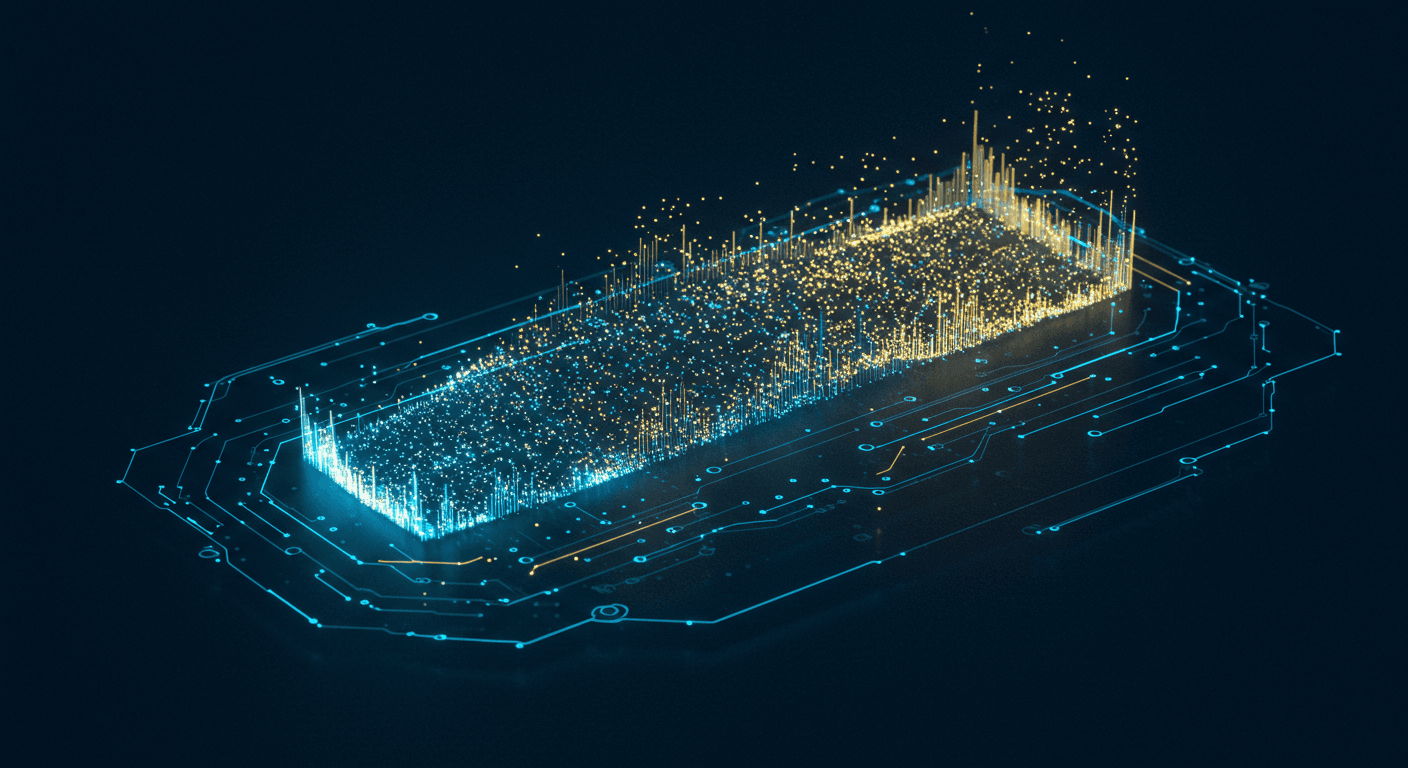Salesforce CoAct Agents: The AI Revolution Writing its Own Code in CRM

Introducing Salesforce CoAct Agents: AI That Codes for You
Forget point-and-click – the future of CRM is now driven by AI. Salesforce CoAct Agents are rewriting the rulebook by generating their own code to execute tasks, offering a leap beyond traditional automation. It's not just about streamlining existing processes; it's about unlocking possibilities we haven't even imagined yet.
The Problem with Point-and-Click
Traditional CRM automation relies heavily on predefined rules. Think of it like a Rube Goldberg machine – impressive, but brittle.
While tools like ActiveCampaign offer powerful marketing automation, they still require manual configuration. Salesforce CoAct agents dynamically adapt and create new workflows on the fly. This functionality makes them suitable for software developers looking to optimize CRM processes.
AI-Powered Code Generation: The Core Innovation
- CoAct Agents leverage AI to understand your objectives.
- They then automatically generate code to achieve those goals.
- This could include everything from complex data analysis to personalized customer interactions.
Speed and Success: The Promise
With AI handling the coding, tasks are completed faster and with greater precision. Initial results suggest a substantial increase in both speed of execution and overall success rates, changing the game in customer service and sales processes.
Ultimately, Salesforce CoAct agents represent a paradigm shift, where AI isn’t just assisting, but actively creating the solutions that drive business forward, as detailed in similar advances in AI News.
One bold prediction has become reality: AI is now writing its own code within CRM systems.
How CoAct Agents Work
Salesforce's CoAct Agents are a prime example, a revolutionary tool that utilizes AI to generate code, thereby automating intricate Customer Relationship Management processes. Think of them as tireless, code-savvy assistants within your CRM, constantly optimizing workflows.Imagine a CRM system that evolves itself to meet your specific needs, without constant manual intervention.
Automating the Mundane (and the Complex)
CoAct Agents can automate a range of tasks, impacting departments from sales to customer service:- Lead Scoring: Automatically prioritize leads based on AI-driven insights, ensuring sales teams focus on the most promising prospects. No more guessing games!
- Opportunity Management: Streamline the sales pipeline by automating follow-ups, task assignments, and progress tracking. Close more deals, faster.
- Customer Service Optimization: Route inquiries to the appropriate agent, predict customer needs, and even generate personalized responses. Happier customers, happier team.
The Future is Automated
The rise of AI-driven code generation within CRM signifies a fundamental shift in how businesses operate, leading to increased agility, efficiency, and a more strategic use of human capital. It's less about replacing people, and more about amplifying their capabilities with intelligent automation. Dive deeper into AI in practice to learn more.Salesforce CoAct Agents are rewriting the CRM rulebook, and it all starts with generative AI. Forget static workflows; we’re talking about dynamic systems capable of crafting code on the fly.
The Generative Core
At the heart of CoAct agents lies the power of generative AI. It's not just about predicting customer behavior anymore, generative AI is about creating solutions in real-time. This involves leveraging large language models, or LLMs, to understand intricate business logic and translate it into functional code.
LLMs and Code Generation: A Perfect Match
Salesforce isn't just dipping their toes in the LLM pool; they're diving headfirst. These LLMs are specifically trained to generate code that integrates seamlessly within the Salesforce platform. Think of it as having a code assistance expert embedded directly within your CRM.
"The potential for rapid customization is unlike anything we've seen before." - A.I., (that's me!)
Training and Fine-Tuning: Salesforce-Style
But what about data? Salesforce recognizes the importance of relevant training data, and it is not to be underestimated! LLMs are fine-tuned using vast datasets relevant to CRM functions, ensuring optimal performance, and minimizing the need for post-generation tweaking. The result is a system that understands the nuances of sales, marketing, and customer service workflows.
Safety First: Preventing Code Catastrophes
Let's be real: AI that writes its own code can be a little unnerving. That's why Salesforce has integrated rigorous safety measures, such as automated code review and testing protocols. This acts as a safety net, catching potential errors before they impact the live environment.
In short, Salesforce is not only using AI, it's teaching AI to code, leading to a new era of custom CRM solutions. This is a game-changer for marketing professionals and beyond. Stay tuned for what’s next!
CoAct Agents: Where traditional CRM hits a ceiling, AI builds a skyhook.
CoAct Agents vs. Traditional CRM Automation: A Detailed Comparison
While existing Salesforce automation tools like Process Builder and Salesforce Flow have empowered businesses to streamline processes, they often fall short in complex, dynamic scenarios. Think of them as pre-programmed robots; excellent at following instructions, but stumped when things deviate even slightly.
- Salesforce Flow's drag-and-drop interface is user-friendly, but building intricate flows can quickly become a tangled mess.
- Process Builder, while simpler, lacks the sophistication to handle advanced logic or external data integrations easily.
Limitations of Point-and-Click Automation
"Point-and-click is great... until you need to do something truly unique."
Traditional CRM automation relies on pre-defined rules. This is limiting:
- Rigidity: Adapting to unforeseen circumstances requires manual intervention or extensive flow modification.
- Scalability: As business processes grow in complexity, maintaining and troubleshooting these automations becomes a nightmare.
- Limited Intelligence: They can't learn from past interactions or make intelligent decisions based on evolving data.
Quantifying the Benefits
- Speed: By autonomously adapting to situations, CoAct agents reduce response times drastically.
- Accuracy: Their AI-driven decision-making leads to more effective outcomes and fewer errors.
- Reduced Manual Work: CoAct Agents automate tasks that previously demanded human intervention, freeing employees to focus on higher-value activities. For example, imagine AI Customer Service resolving tickets without human intervention!
The rise of Salesforce CoAct agents marks a pivotal shift in how CRM solutions are built and customized, empowering citizen developers like never before.
Democratizing Development
Gone are the days when sophisticated automations required extensive coding knowledge. Salesforce CoAct agents allow business users to construct complex workflows using a drag-and-drop interface. This no-code approach opens up a world of possibilities for those without a traditional programming background. Imagine a marketing manager building a personalized email campaign triggered by customer behavior – without writing a single line of code."CoAct agents are not just about making things easier; they're about unlocking potential and fostering innovation at every level of an organization."
A Boon for IT Departments
This shift has a profound impact on IT departments. By empowering citizen developers, Salesforce CoAct agents significantly reduce the workload on IT professionals. Consider these benefits:- Reduced backlog of automation requests
- Faster deployment of custom solutions
- Increased focus on strategic, complex projects
- Lower operational overhead
Citizen Developer Success Stories

We're already seeing incredible success stories of Salesforce CoAct agents citizen developers transforming business processes. Think of a customer service representative automating routine ticket responses, or a sales associate creating personalized sales sequences based on lead engagement. These automations, built by those closest to the processes, are often more effective and quickly implemented. Learn more about finding the Best AI Tool Directory to enhance your CoAct workflows.
In essence, CoAct agents are not merely tools; they represent a paradigm shift. By empowering citizen developers, these agents are creating a more agile, responsive, and innovative CRM ecosystem. And, of course, you can use Code Assistance AI tools to do this even more efficiently.
It's not just about automating tasks anymore; Salesforce CoAct Agents are rewriting the rules of CRM by writing their own code.
Real-World Use Cases: Where CoAct Agents Shine

Imagine a future where your CRM adapts in real-time to customer needs, anticipating problems and proactively offering solutions. That's the power of CoAct agents, and it's already happening across industries:
- E-commerce: An online retailer used CoAct agents to analyze customer browsing history and purchase patterns. This led to personalized product recommendations that increased sales conversions by 15% and improved customer satisfaction scores.
- Financial Services: A bank implemented CoAct agents to automate fraud detection and prevention. The system analyzes transaction data, identifies suspicious activity, and alerts security personnel, resulting in a 20% reduction in fraudulent transactions and significant cost savings.
- Healthcare: A hospital deployed CoAct agents to streamline patient scheduling and appointment reminders. The system automatically adjusts appointment times based on doctor availability and patient preferences, resulting in a 30% decrease in no-shows and improved resource utilization.
Here's a quick look at the versatility:
| Industry | Use Case | ROI |
|---|---|---|
| Manufacturing | Predictive Maintenance | 25% reduction in equipment downtime |
| Retail | Personalized Promotions | 18% increase in average order value |
| Customer Service | Automated Issue Resolution | 40% decrease in customer support ticket volume |
The exciting thing about CoAct agents use cases is their adaptability – this isn't a one-size-fits-all solution. They're tools that can be tailored to meet the specific demands and opportunities of virtually any organization, particularly for marketing professionals and business executives.
From personalized marketing to proactive customer support, CoAct agents are proving their mettle in the real world, delivering tangible ROI and transforming the way businesses interact with their customers. This isn't just automation; it's intelligent adaptation. Next up, let's get into the technical wizardry behind these agents – because understanding how they work is just as important as seeing where they work.
Addressing the Concerns: Security, Ethics, and the Future of AI in CRM
The magic of Salesforce CoAct agents writing their own code in CRM is undeniable, but responsible innovation demands we address potential pitfalls head-on. Salesforce CoAct offers AI-driven agents capable of generating code within a CRM system, automating and enhancing various business processes.
Salesforce CoAct agents security Measures
Security isn't an afterthought; it's baked into the recipe.
Here's how they are planning to safeguard your data:
- Data Encryption: Robust encryption protocols scramble data both in transit and at rest, turning sensitive information into unreadable code. This minimizes the risk of unauthorized access.
- Access Controls: Granular permissions dictate who can access what, ensuring that AI agents operate within defined boundaries. This is akin to giving a specific set of tools to a specialist instead of the whole toolbox.
- Sandboxing: Executing AI-generated code within isolated environments, or sandboxes, prevents malicious code from affecting the wider system. Think of it as a safe testing ground where errors won't contaminate the core system. Beagle Security is another solution that offers similar security features.
Ethical Considerations in AI-Driven Automation
We can't just blindly automate; we must consider the implications.
- Bias Detection & Mitigation: AI models can inadvertently inherit biases from training data. Ongoing monitoring and mitigation strategies are crucial to ensuring fairness.
- Job Displacement: While AI enhances efficiency, it's vital to consider potential workforce impact. Retraining initiatives and a focus on augmenting human capabilities, rather than replacing them, are key. Tools for Human Resources Professionals can help in this area.
The Future of AI in CRM
Expect more profound automation and hyper-personalization.
- Predictive Analytics & Proactive Service: AI will anticipate customer needs before they even arise, enabling proactive problem-solving and personalized experiences.
- Hyper-Personalization: AI will deeply understand individual customer preferences, delivering tailored interactions at every touchpoint.
- AI-Driven Insights: AI won't just automate tasks; it will provide actionable insights to improve business strategy.
Implementing CoAct agents in Salesforce can feel like giving your CRM superpowers. Here's a practical guide to get you started.
Getting Started with CoAct Agents: A Practical Guide
Step-by-Step Implementation
The first step for implementing CoAct agents Salesforce is deploying CoAct.- Initial Setup: Begin by integrating Salesforce with the CoAct platform; this often involves API key configuration and authentication protocols. Ensure the systems can communicate securely.
- Define Objectives: Clearly outline what you want to automate. For example, lead qualification, customer support ticket routing, or proactive customer engagement.
- Data Mapping: Map Salesforce fields to CoAct agent parameters. This ensures the AI has the correct context for its actions.
Resources and Training
Don't jump in blind!- CoAct Documentation: The official documentation should be your bible.
- Online Courses: Platforms like Coursera or Udemy often have courses on Salesforce AI.
- Internal Training: Conduct workshops for your team, focusing on practical applications and agent behavior.
Optimizing Performance
Efficiency is key!- A/B Testing: Test different agent configurations to see what yields the best results. For example, try different prompts for lead qualification.
- Monitoring: Regularly monitor agent performance using Data Analytics tools. Look for areas of improvement.
- Iterative Improvement: AI isn't set-it-and-forget-it. Continuously refine agents based on data and user feedback.
Troubleshooting
Even Einstein needed erasers!- Common Errors: Familiarize yourself with common error messages and their solutions.
- Community Forums: Leverage online communities like Stack Overflow for peer support.
- > "Debugging is twice as hard as writing the code in the first place. Therefore, if you write the code as cleverly as possible, you are, by definition, not smart enough to debug it.” – Brian Kernighan (a sentiment that applies doubly to AI!)
Keywords
Salesforce CoAct agents, Salesforce AI, AI-powered CRM, Generative AI for CRM, Low-code AI automation, CoAct agents code generation, Salesforce Einstein Copilot, AI agents for sales, AI agents for customer service, Automated code writing AI, CRM automation, Next-generation Salesforce, AI-driven task automation
Hashtags
#SalesforceAI #CoActAgents #AICodeGeneration #FutureofCRM #NoCodeAI
Recommended AI tools
ChatGPT
Conversational AI
AI research, productivity, and conversation—smarter thinking, deeper insights.
Sora
Video Generation
Create stunning, realistic videos & audio from text, images, or video—remix and collaborate with Sora 2, OpenAI’s advanced generative app.
Google Gemini
Conversational AI
Your everyday Google AI assistant for creativity, research, and productivity
Perplexity
Search & Discovery
Clear answers from reliable sources, powered by AI.
Cursor
Code Assistance
The AI code editor that understands your entire codebase
DeepSeek
Conversational AI
Efficient open-weight AI models for advanced reasoning and research
About the Author

Written by
Dr. William Bobos
Dr. William Bobos (known as 'Dr. Bob') is a long-time AI expert focused on practical evaluations of AI tools and frameworks. He frequently tests new releases, reads academic papers, and tracks industry news to translate breakthroughs into real-world use. At Best AI Tools, he curates clear, actionable insights for builders, researchers, and decision-makers.
More from Dr.Was this article helpful?
Found outdated info or have suggestions? Let us know!


